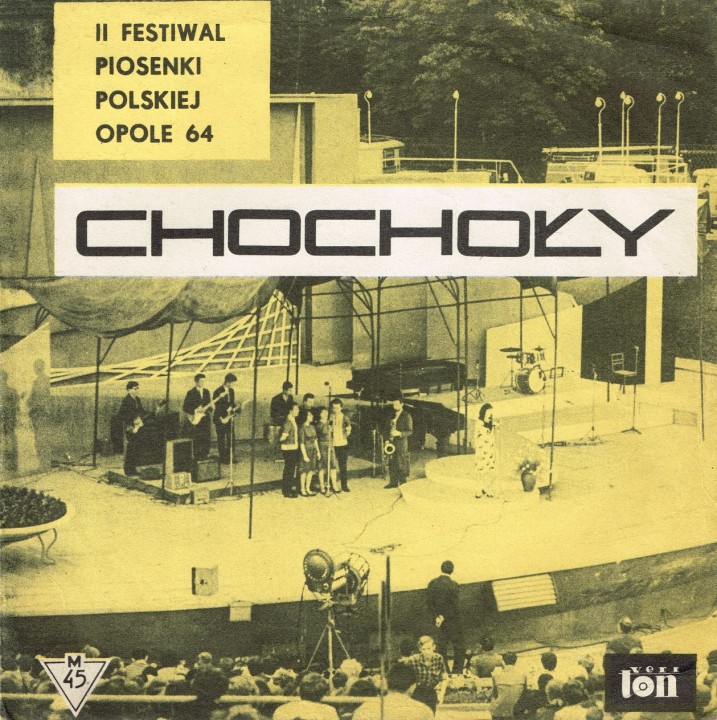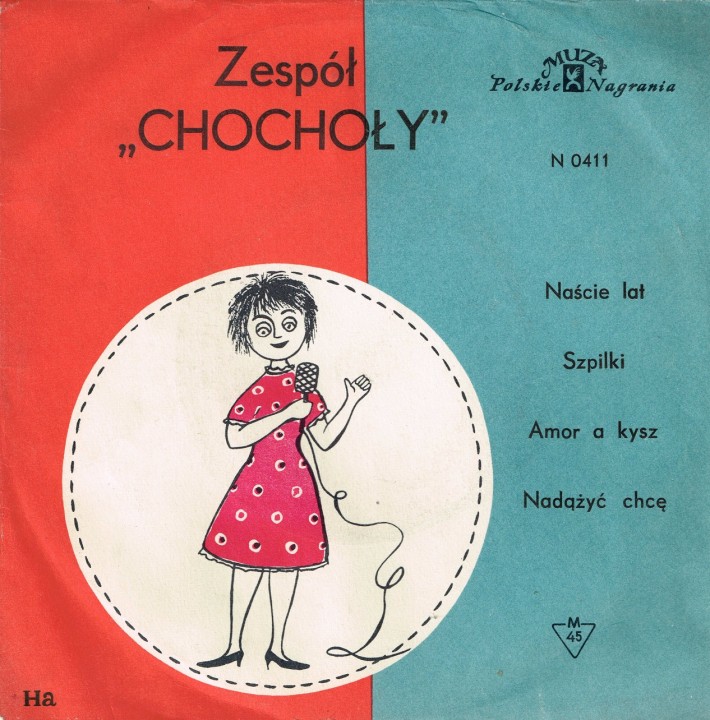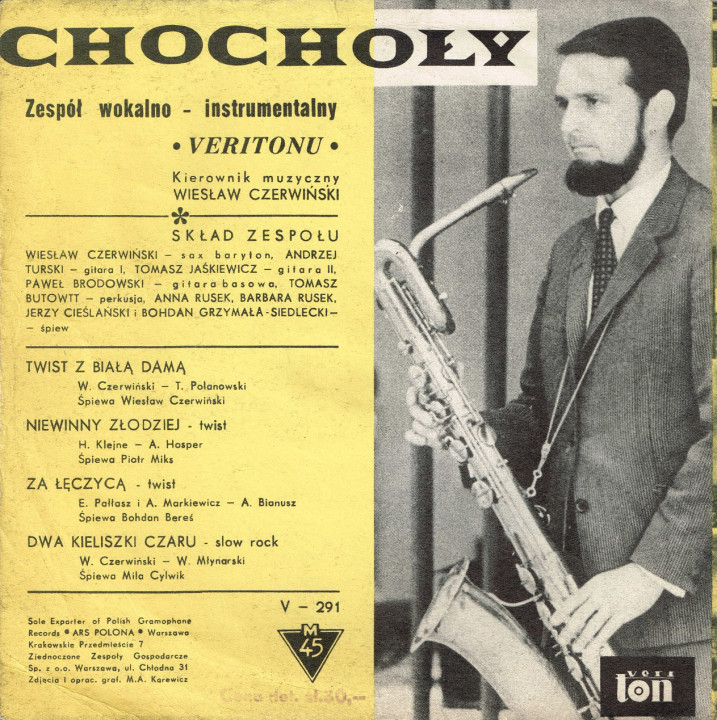This is the second of Pete Kowalski’s articles on ’60s rock groups from Poland. In February, he wrote about Romuald i Roman:
Chochoły (The Straw Men) were one of the most noteworthy Polish amateur rock groups, founded in Warsaw in 1962. The initial lineup featured: Jan Goethel (guitar), Bogusław Poniatowski (guitar), Mieczysław Salecki (guitar) and Tomasz Butowtt (drums).
The early period of the band’s activity was packed with frequent lineup changes. Notably, Jan Goethel left Chochoły in late 1963 to form another beat group that merits a listen: Dzikusy.
Initially the band performed cover versions of popular instrumental rock and roll tunes including the works of The Shadows and The Ventures who were rather well known by the Polish teenage audience thanks to the omnipresent waves of Radio Luxembourg.
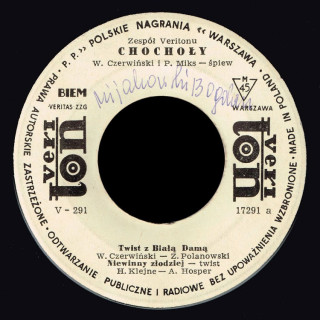 Having gained some recognition and applause, the band participated in the second National Song Contest held in Opole ever since 1963, representing the Veriton record plant (owned by the Polish Catholic Association “PAX”) and backing a group of young pop singers, none of whom had much success. This, however, allowed Chochoły to release their first 7” EP (the most common pop record format in 1960s Poland) with songs from the festival.
Having gained some recognition and applause, the band participated in the second National Song Contest held in Opole ever since 1963, representing the Veriton record plant (owned by the Polish Catholic Association “PAX”) and backing a group of young pop singers, none of whom had much success. This, however, allowed Chochoły to release their first 7” EP (the most common pop record format in 1960s Poland) with songs from the festival.
1965 would see the band working as session musicians on several pop, easy listening, gypsy records that are simply uninteresting with the music being often compromised by artless vocals, doltish lyrics and unconvincing arrangements. Apart from their studio work, the band still played numerous dance gigs filled with energetic yet primitive guitar music.
Chochoły’s live nature, so different from what was heard on their past recordings, was captured in the 1965 movie “Sam pośród miasta” (“Alone in the City”) starring Zbigniew Cybulski (often called the Polish James Dean). The film’s entire dance club scene, backed with a simple, repeating guitar riff played by the group on their cheaply made (by western standards) and hard-earned instruments is available on YouTube and worth watching as it gives an idea of how would a typical youngster rock and roll dance party look like in mid-1960s communist Poland.
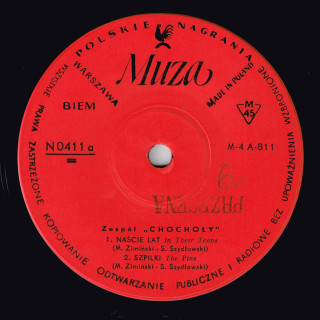 The breakthrough came in 1966, as far as Polish garage rock history is concerned. Polskie Nagrania (the biggest and in fact the only record company in Poland in the 1960s) decided to issue a series of 7” EPs with uncensored recordings of several most important amateur rock bands including Chochoły, Kawalerowie and Pięć Linii. Until then, Polskie Nagrania relegated groups who were possibly deemed unprofessional, or their music not serious enough for the major Muza label, to the Veriton label. Veriton records were low quality pressings, made in small numbers from contaminated vinyl with old machinery.
The breakthrough came in 1966, as far as Polish garage rock history is concerned. Polskie Nagrania (the biggest and in fact the only record company in Poland in the 1960s) decided to issue a series of 7” EPs with uncensored recordings of several most important amateur rock bands including Chochoły, Kawalerowie and Pięć Linii. Until then, Polskie Nagrania relegated groups who were possibly deemed unprofessional, or their music not serious enough for the major Muza label, to the Veriton label. Veriton records were low quality pressings, made in small numbers from contaminated vinyl with old machinery.
Chochoły issued their two best and most notable extended-plays in May 1966:
Pronit N-0410: “Kocham ją” (“I Love Her”)/ “Zaimki” (“Pronouns”) / “Nowa gra” (“New Game”)/ “Uwierz mi” (“Believe Me”) – issued in a generic company sleeve
Muza N-0411: “Naście lat” (“Teenage”) / “Szpilki” (“High Heels”) / “Amor a kysz” (“Get Lost, Cupid”)/ “Nadążyć chcę” (“I Want to Keep Up”) – issued in a semi-dedicated sleeve bearing the name of the group and a song list
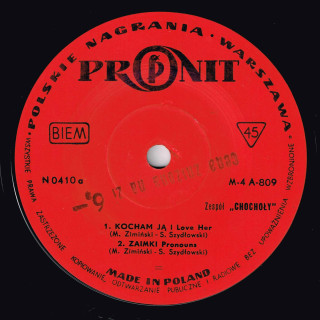 The recordings were probably taped during a single session and are among the best examples of Polish garage rock. Packed with rocking organ riffs, stomping rhythm and exuberant solos, those 7-inchers are a must-have or at least a must-listen for anybody interested in teenage garage rock from behind the Iron Curtain.
The recordings were probably taped during a single session and are among the best examples of Polish garage rock. Packed with rocking organ riffs, stomping rhythm and exuberant solos, those 7-inchers are a must-have or at least a must-listen for anybody interested in teenage garage rock from behind the Iron Curtain.
The lyrics of two of these songs (“Szpilki” and “Amor a kysz”) contain what would probably be unthinkable in most of the Western world of the era: the word “sex” which in Polish has only one meaning and it’s not “gender”. Add to that the “frivolous” music and you have material whose 1966 release seems improbable to a Polish listener 50 years later. There’s not a single weak number on these records though “Nadążyć chcę” definitely steps out with its guitar riff borrowed from The Kinks’ “I Need You” and “Naście lat” features great organ licks and a vigorous rave-up solo.
Several months after releasing the two extended-plays, Chochoły broke up and their last lineup: Tomasz Jaśkiewicz (guitar), Marian Zimiński (organ), Paweł Brodowski (bass) and Tomasz Butowtt (drums) went on to found Akwarele – Czesław Niemen’s backing band active between 1966 and 1969.
Most of Chochoły recordings are available on a CD compilation “Gwiazdy polskiego big beatu: Chochoły” released on Polskie Nagrania Muza, catalogue number PNCD 1467. Two of songs that originally appeared on Muza N-0411 EP are available on a highly recommendable vinyl compilation “Warszawski rock and roll lat 60.” released on Polskie Nagrania Muza, catalogue number SX 4009. There’s also a CD version (PNCD 1262) that contains four bonus tracks.


